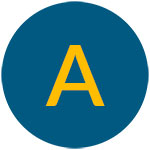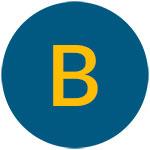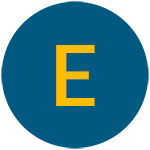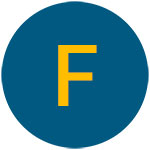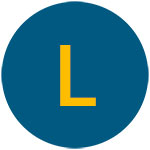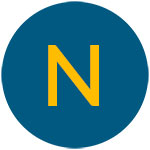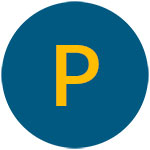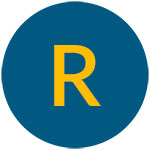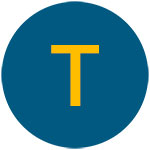Written by Scribendi
Here's the thing about the English language: it can be tricky. It's not just that English can be hard to learn; it can literally trick you.
Both native speakers and those who speak English as a second language often have trouble with homonyms, homophones, homographs, and heteronyms—that is, words that sound alike or are spelled the same but have different meanings and/or pronunciations.
Other words may not sound alike or look alike, but they are close enough in meaning that people often confuse them. A good editor, like one of the experts at Scribendi, can ensure that you always use the right word. Consider having your important documents edited or proofread by one of our professionals.
In the meantime, we've compiled a list of commonly confused words and troublesome expressions to help you sort out these tricky terms.
A | B | C | D | E | F | G | H | I | L | M | N | O | P | R | S | T | V | W | Y
A vs. An:
A is an indefinite article that is used when the word that follows does not begin with a vowel: "A cat was in my yard today." An is an indefinite article that is used when the word that follows does begin with a vowel: "Would you like an apple?"
A few vs. Afew:
A few is a phrase meaning not many, but more than one: "Hurry up if you want yellow, because we only have a few left." Afew is an incorrect but common spelling of a few.
A long vs. Along:
A long is a phrase used to define the length of an object or a time: "It is a long time until Friday." Along is a preposition that means beside or parallel to: "We walked along the riverbank."
A lot vs. Allot vs. Alot:
A lot is a phrase that means an abundance of something: "Wow, we have a lot of food!" Allot is a verb meaning to give or assign someone a portion of something: "I will allot you 20 minutes in which to complete the test." Alot is a common but incorrect spelling of a lot.
A piece vs. Apiece:
A piece is a phrase used to refer to a part of something: "Would you like a piece of cake?" Apiece is an adverb that is used interchangeably with each: "Pumpkins were on sale at three for a dollar or fifty cents apiece."
A while vs. Awhile:
A while and awhile both refer to periods of time; a while is a noun, and awhile is an adverb. When the word for is used in a prepositional phrase, a while must be separated: "We might be here for a while." Awhile is an adverb meaning a period of time: "It might be awhile before I'm ready."
Accede vs. Exceed:
Accede is a verb meaning to agree or to give in: "The Queen will not accede to your demands." Exceed is a verb meaning to go beyond: "You have exceeded my expectations on your report card."
Accept is a verb that means to receive: "Liz was happy to accept the gifts." Except can be used as a preposition or a conjunction to mean excluding: "She loved all the presents—except the one from Jack."
Ad vs. Add:
Ad is a noun that is a short form of advertisement: "The number of ads in this magazine is outrageous." Add is a verb used to indicate putting separate things together: "Please add fries to my order!"
Adapt vs. Adopt:
Adapt is a verb meaning to make something appropriate or usable for a particular situation: "The polar bears have to adapt to the warming climate." Adopt is a verb for the legal process undertaken when bringing another person's child into your family to raise as your own: "We plan to adopt a little girl."
Admission vs. Admittance:
Admission refers to the process of getting permission to enter a place or institution: "Congratulations on receiving admission to Harvard!" It can also refer to a confession or acknowledgement of the truth: "After hours of interrogation, the police secured an admission of guilt from the suspect." Admittance is a noun used to express acceptance into a physical place: "Admittance into the theater will be denied to latecomers."
Adverse vs. Averse:
Adverse is an adjective that means harmful or unfortunate and generally refers to things rather than people: "The medication caused an adverse reaction." Averse is an adjective that means to feel negatively about something and generally refers to people: "He was averse to asking his doctor about it."
Advice vs. Advise:
Advice is a noun that means an opinion or recommendation: "She always gave sound advice." Advise is a verb that means to offer an opinion or recommendation: "She advised him not to interrupt again."
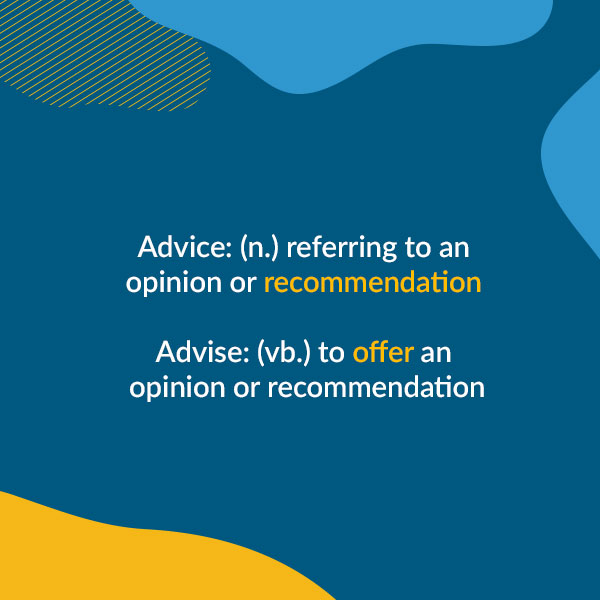
Aesthetic vs. Ascetic:
Aesthetic is an adjective that describes an appealing visual look: "The aesthetics of the building were beautiful." Ascetic is an adjective that is used to express the avoidance of pleasure by practicing self-discipline: "Some religions support ascetic practices."
Affect is a verb that means to influence: "The cold weather can affect the crops." It is also used in the field of psychology to refer to someone's demeanor: "She displayed a happy affect." Effect is a noun that means an outcome or result: "The effect of the cold weather was a lower yield." Effect is also a verb that means to make happen: "The board will effect these changes immediately."
Aid vs. Aide:
An aid is a non-living form of help to improve a weakening process: "Grandpa wears a hearing aid." It can also be used as a verb meaning to help: "Your teacher will aid you in your learning." An aide is someone who provides assistance to a situation or a person: "The nurse acted as an aide to the sick patient."
Aisle vs. Isle:
Aisle is a noun that means a path or passageway: "Go down the cereal aisle in the grocery store." An isle is a noun that describes a small island: "We spent our honeymoon on a deserted isle."
All ready vs. Already:
All ready is a phrase that means completely prepared: "She was all ready for her test." Already is an adverb that means previously: "She had already studied for it."
All right vs. Alright vs. Alrite:
All right is a phrase that indicates agreement or satisfaction: "Yes, it is all right with me if we meet at the park." Both alright and alrite are incorrect but common spellings of all right. These are arguably usable in online forums but should be avoided in formal writing.
All together vs. Altogether:
All together is a phrase that implies that multiple people are doing something as a group: "I can't remember the last time we were all together." Altogether is an adverb that means entirely, in total, or completely: "Altogether, we have 20 dollars."
Alliterate vs. Illiterate:
Alliterate is an adjective that refers to two or more words having the same beginning sound: "When and where have alliterate sounds." It can also be used as a verb to describe this phenomenon: "Sammy and Susan's names alliterate." Illiterate is an adjective meaning unable to read: "Since you are able to read this, you are not illiterate."
Allowed vs. Aloud:
Allowed is an adjective that means having permission to do something: "You are allowed to go to the dance." Aloud is an adjective that refers to something said that can be heard by anyone who is near enough: "I have a bad habit of speaking my thoughts aloud."
Allude vs. Elude vs. Illude:
Allude is a verb that means to refer to something indirectly: "In the press conference, the police chief alluded to the problem." Elude is a verb that means to avoid or escape: "The suspect was very good at eluding the police." Illude is a verb that means to deceive or trick: "She was also known to plant false evidence to illude them."
Allusion vs. Illusion:
Allusion is a noun meaning an indirect reference: "When analyzing a novel, it's important to understand the allusions it makes to other literary works." Illusion is a noun that means a trick of the senses that is not part of reality: "The magician cutting the girl in half was simply an illusion."
Altar vs. Alter:
Altar is a noun meaning an elevated place or structure for religious rites: "The priest will stand at the altar to marry the couple." Alter is a verb meaning to make different: "She wanted to alter the length of the jeans."
Alternate vs. Alternative:
Alternate is a verb that means to rotate in succession or in turns: "To give everyone a turn, students will alternate between the PC and Mac computers." It can also be used as a noun to refer to a back-up: "He came in second place, so he will serve as the alternate." Alternative is a noun meaning additional or multiple choices or options: "If they don't have apple juice, just get me a similar alternative, like orange juice." It can also be used as an adjective referring to another possibility: "Since the TV is broken, we'll have to look for alternative entertainment."
Amoral vs. Immoral:
Amoral is used to describe someone who completely lacks moral sensibility and isn't concerned with right or wrong: "The man was amoral and insensitive to the harm he was about to cause." Immoral is an adjective that describes behavior that violates commonly held morals: "He knew stealing the car was immoral."
Angel vs. Angle:
An angel is a spiritual being found in Heaven: "She believed she had a guardian angel." An angle is a noun that refers to the degree of separation between two connected lines: "A square has four identical angles."
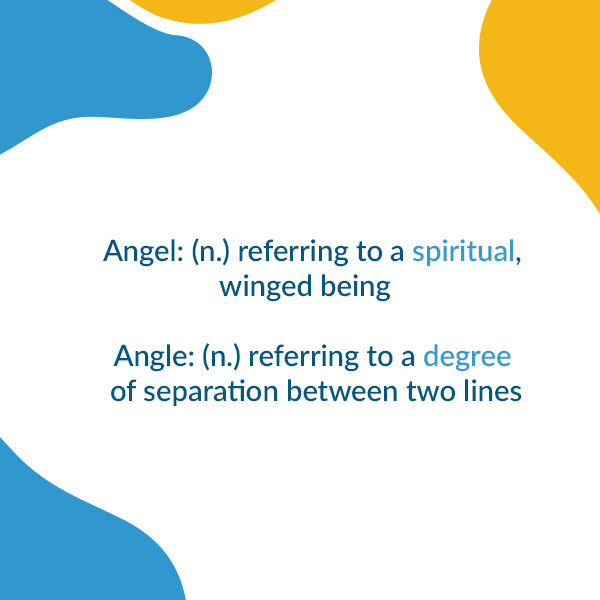
Appose vs. Oppose:
Appose is a verb that refers to placing objects close to or on top of each other: "The clock and the painting were apposed on the wall." Oppose is a verb that means you are against something or do not agree with it: "I am opposed to your suggestion that cricket is better than hockey."
Appraise vs. Apprise:
Appraise is a verb that means to estimate or give value to something: "The real estate agent appraised the house at $1.2 million." Apprise is a verb meaning to inform or give notice to someone: "I will apprise you of my status as soon as you return."
Arrant vs. Errant:
Arrant is an adjective meaning complete, utter, or thorough: "The arrant thief was not to be trusted." Errant is an adjective that is similar to wandering: "The errant entertainer never stayed more than two nights in a given town."
As soon vs. Assume:
As soon is a phrase that implies not now but after something else: "We can get ice cream as soon as you clean your room." Assume is a verb that means to form a generalization or theory about something or to take control of something: "I'm going to assume you were on time for your shift today" or "I'm going to assume power over the country."
Ascent vs. Assent:
Ascent is a noun that refers to going up or advancing from an original position: "I watched the balloon's ascent into the sky." Assent is a noun that means agreement: "We need to reach assent on how to do this project."
Assemble vs. Ensemble:
Assemble is a verb that means to put or gather pieces together to make a whole: "We need to assemble this toy train." Ensemble is a noun that means a collaboration of complementary units that together create a particular look: "I love your outfit. What a beautiful ensemble!''
Assure vs. Ensure vs. Insure:
Assure is a verb that means to inform or tell positively: "He assured his father that everything was okay." Ensure is a verb that means to make sure or certain: "Please ensure you are not busy tomorrow morning." Insure is a verb that means to guarantee against loss or harm: "The company insures my car for $80 a month."
Aural vs. Oral:
Aural is an adjective that means heard by the ear: "The dentist flinched at the aural assault from the screaming patient." Oral is an adjective that means communicated by voice: "We have an oral exam tomorrow in which we answer questions from the professor."
Awaken vs. Awoken:
Awaken is a present-tense verb meaning to rouse from sleep: "We must awaken the dragon." Awoken is the past-tense form of the same verb: "The dragon has awoken."
Bail vs. Bale:
Bail is a noun that refers to money given by someone in order to release another person from incarceration: "If you pay my bail, I'll be able to get out of here." Bale is a noun that means a tightly wrapped package of a finished product: "Go put the hay into bales so we can stack them in the truck."
Bait vs. Bate:
Bait is a verb meaning to entice something toward something else: "We baited the fish by putting a worm on the hook." It can also be used as a noun to refer to the item used to entice or lure something: "We used a worm as bait." Bate is an adjective meaning held in suspense or anticipation: "I waited patiently with bated breath."
Ball vs. Bawl:
Ball is a noun that refers to a spherical object often used in sports and games: "For bowling, you need a heavy ball with three finger holes." Bawl is a verb that refers to crying heavily: "When she left for the army, her husband fell to his knees and started to bawl."
Balmy vs. Barmy:
Balmy is an adjective that means warm but still pleasant: "It's balmy outside today." Barmy is an adjective that refers to something unwise, irrational, or foolish: "Your resolution to eat an entire pizza by yourself is absolutely barmy!"
Bare vs. Bear:
Bare is an adjective that means without cover or clothing: "He wore bright green swimming trunks, and his chest was bare." Bear is a verb that means to hold up, support, or tolerate, and it is also a noun that refers to an animal: "The grizzly bear cannot bear to be without her cubs."
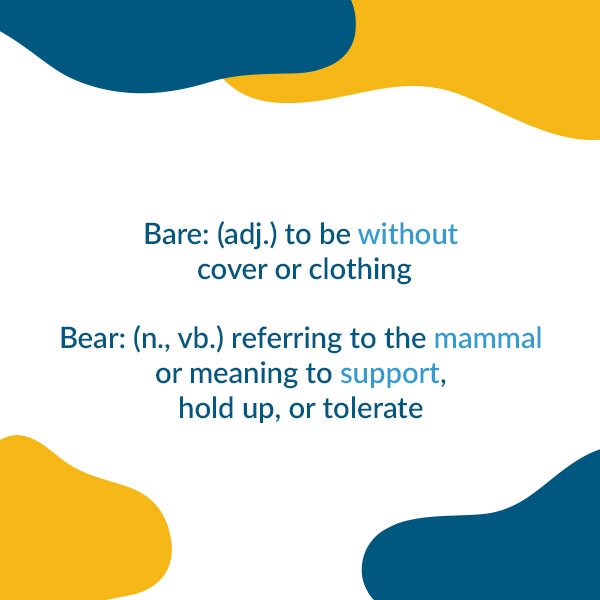
Bazaar vs. Bizarre:
Bazaar is a noun that means an outdoor marketplace: "Let's take a trip to the bazaar for fresh fruit." Bizarre is an adjective that means something weird, unique, out of place, or unexpected: "That ice storm in July was bizarre."
Belief vs. Believe:
Belief is a noun that means to have trust or faith in the properties of something: "He held a firm belief that he was right and she was wrong." Believe is a verb that means to hold faith or trust in something, such as a religion or a theory. "Do you believe in Santa Claus?"
Berth vs. Birth:
Berth is a noun that means a space adequate for a ship to move, dock, or anchor: "Move toward the berth so we can dock and get the passengers off the ship." Birth is a noun that means the process by which mammals enter the world: "The horse gave birth to a small bay filly."
Bloc vs. Block:
Bloc is a noun that refers to a group of people who are united by a commonality: "America and Canada form a bloc that is connected by capitalist ideology." Block is a noun that refers to a cube of a solid substance, such as wood: "Use that block of wood to hold up the doorframe." It can also refer to the area surround by four streets in a city or town: "I'm so glad to live only two blocks from the grocery store."
Boarder vs. Border:
Boarder is a noun that refers to people who pay money for a room and/or meals at a particular institution: "The boarders at this private school pay roughly $500 per month." Border is a noun that refers to something that is set up to show a boundary around an area: "You need to show your passport at the border in order to cross."
Born vs. Borne:
Born is an adjective that refers to the process by which a living creature enters the world: "When were you born?" Borne is an adjective that refers to something that is carried by something else: "I contracted mosquito-borne malaria while in Uganda."
Bough vs. Bow:
Bough is a noun that means the branch of a tree: "I want to live under the bough of a willow tree." Bow is a noun that means the front part of a boat: "When the tide is high, stay in the bow."
Brake is a noun that means a device that is used to stop a vehicle in motion: "Push the brake if you want to stop." It can also be used as a verb to describe the process of slowing or stopping a moving vehicle: "Be sure to brake as you drive down the steep hill." Break is a noun that means a pause: "Go for your break so you can have a coffee." It can also mean a separation of something into pieces: "The quarterback snapped his femur; it was a nasty break." Last, it can be used as a verb that means to snap or separate into pieces: "If you play ball in the house, you might break a lamp."
Breach vs. Breech:
Breach is a noun that means an infringement of a rule or set order: "Not wearing your name tag is a breach of protocol." It can also refer to a rip, hole, or other unwanted opening: "There was a breach in the wall." Breech is a noun referring to the buttocks of a person or animal: "A breech baby is born feet- or buttocks-first."
Break up vs. Breakup:
As two words, break up is a verb that refers to the act of separating: "After the way he acted, you two definitely need to break up." As one word, breakup is a noun that refers to a separation of a romantic couple: "Kim and Tom's breakup was really nasty."
Broach vs. Brooch:
Broach is a verb that means to announce or bring up a topic for debate: "I don't see why mom had to broach the subject of my ex-boyfriend." Brooch is a noun that means a type of jewelry that is typically clipped to a shirt or sweater: "My grandma wears a brooch to church."
Buy vs. By:
Buy is a verb that means to purchase or spend money on something: "I want to buy a TV." By is a preposition that means to be close to: "We are by the station now."
Canvas vs. Canvass:
Canvas is a noun that means a type of fabric known for being tough and strong: "I use a canvas cover to protect the barbeque." Canvass is a verb that means to try to get people's support or find out where their support lies: "Canvass the block to generate interest in the new park we're building."
Capital vs. Capitol:
Capital is a noun and is a seat of government, generally a city: "Ottawa is the capital of Canada." Capitol is a noun and is the building in which a legislature meets: "The capitol building is really quite beautiful."
Carat vs. Caret vs. Carrot vs. Karat:
Carat is the unit of measurement for gemstones: "My fiancé bought me a two-carat diamond ring." A caret is a mark on printed matter indicating where something is to be inserted: "The proofreader used a caret mark to indicate a missing word." A carrot is a vegetable: "Would you like me to add some carrots to the soup?" Karat is the unit used to measure the purity of gold: "My fiancé bought me a 24-karat gold ring."
Censor vs. Censure vs. Sensor:
Censor is a verb that means to examine in order to suppress or delete objectionable material: "Please don't censor my emails." Censor can also be a noun meaning a person who censors: "The censor examined the questionable material." Censure is a verb that means to criticize or strongly disapprove: "Please don't censure me for caring too much." Sensor is a noun and is a mechanical device that monitors light, sound, or movement: "We set up sensors to alert us to intruders."
Cereal vs. Serial:
Cereal is a noun that refers to a breakfast food: "My favorite cereal is Frosted Wheat." Serial is a noun that means a series of something, such as a show or a book: "Charles Dickens is the author of the serial novel The Pickwick Papers."
Cheap vs. Cheep:
Cheap is an adjective that means frugal or reluctant to spend money: "I can't tell if she's a smart buyer or just cheap." Cheep is a noun that describes a chirping sound usually associated with a bird: "The sparrow in the barn let out a nervous cheep cheep when I walked in." It can also be used as a verb: "The bird cheeped happily on the branch."
Chord vs. Cord:
Chord is a noun that means a sound made by an instrument when multiple pitches are played together: "I need to strum an E chord on my guitar." Cord is a noun that means multiple threads of thin material woven together: "The cord connecting the phone to the wall is covered in a protective plastic layer."
Cite vs. Sight vs. Site:
Cite is a verb that means to show recognition or proof of a source of information: "Make sure you cite all the borrowed ideas you included in your essay." Sight is a noun that means the ability to see, which is one of the five senses: "Good news, Mr. Labadie, your sight is 20/20." Site is a noun that means a designated or marked area: "This is a construction site, so you'll have to wear safety gear."
Climactic vs. Climatic:
Climactic is an adjective that refers to the climax or peak: "The movie was boring and very anti-climactic." Climatic is an adjective that refers to an environment's climate or weather: "And here is Stacy with details on today's climatic conditions."
Coach vs. Couch:
Coach is a noun that means someone who is in charge of leading a team: "The football coach yelled at the team." Couch is a noun that means a piece of furniture for seating two or more people: "I am going to put our couch in the living room."
Coarse vs. Course:
Coarse is an adjective that means having a rough texture: "This sandpaper is very coarse." Course is a noun that refers to a set pathway: "You set a positive course for your future by staying in school."
Complacent vs. Complaisant:
Complacent is an adjective that means content or pleased, often to the point of being careless or self-satisfied: "After years of service, she became very complacent in her duties." Complaisant is an adjective that means inclined or disposed to please: "The man was so complaisant, he went along with anything to make his friends happy."
Complement vs. Compliment:
Complement can function as a noun or verb, referring to something that matches or enhances: "The pillow he bought was a complement to the couch." Compliment can also act as a noun or verb and refers to an expression of praise: "She complimented her friend on her excellent taste."
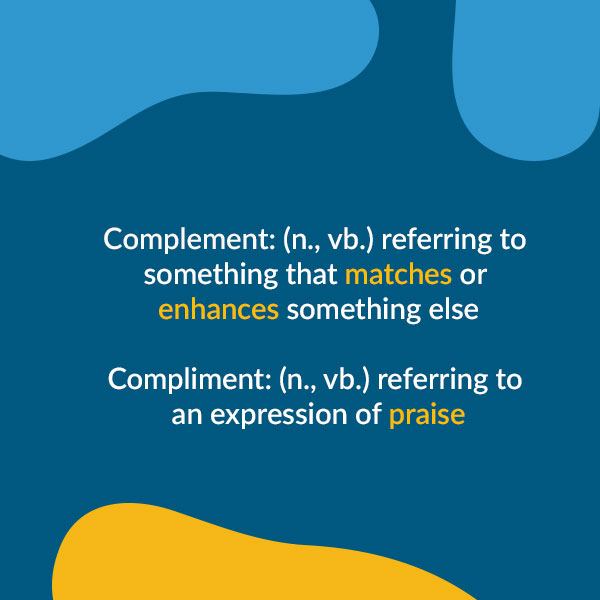
Compose vs. Comprise:
Compose has three main meanings: to write or create something ("The producer composed the entire song"), to calm or settle oneself ("It took her a moment to compose herself after the shock"), and to constitute or make up ("The team is composed of eight players"). Comprise is a verb that means is made up of: "The recipe comprises flour, sugar, and egg."
Conceited vs. Concerted:
Conceited is an adjective that means thinking highly of oneself: "I suspect having so many fans makes some superstars conceited." Concerted is an adjective that means performing a task in a manner that involves cooperation: "Putting on this talent show required a concerted effort from the boys and girls in the class."
Confidant vs. Confident:
Confidant is a noun that means someone you are close to and feel comfortable talking to about important and private matters: "My wife is my confidant; we talk about everything, no matter how personal." Confident is an adjective that means being sure of something: "I am confident that the light goes out when I close the refrigerator."
Continual vs. Continuous:
Continual is an adjective meaning occurring regularly or frequently: "Throughout the two-week visit, we engaged in continual discussions about our future plans." Continuous is an adjective that means without stoppage or interruption: "The Oxford Electric Bell has been chiming continuously since 1840."
Copywriting vs. Copyrighting:
Copywriting is the act of producing written material for manuals, press releases, or advertisements: "Hire a professional to do the copywriting if you need more ads for the event." Copyrighting is the act of securing select privileges for a material (e.g., an invention or written work) in order to prohibit unauthorized duplication: "I plan on copyrighting my invention to make sure no one can steal the idea."
Council vs. Counsel:
Council is a noun that means an assembly of persons: "The city council makes decisions about what's best for the town." Counsel is a verb meaning to give advice: "He asked her to counsel him." It is also a noun referring to the advice itself: "She gave him wise counsel."
Coward vs. Cowered:
Coward is a noun that means someone who shows fear when he or she is expected to be brave or strong: "Bullies who pick on smaller kids are often cowards." Cowered is the past tense form of a verb meaning to recoil in fright: "He cowered in the corner after seeing the troll."
Crape vs. Crepe:
Crape is a noun that means a thin piece of paper or fabric that is creased: "Crape is often used to signify mourning." Crepe is a noun that means a thin version of a pancake, usually topped with fruit: "When we went to Quebec, I had a banana crepe with chocolate sauce."
Cue vs. Queue:
Cue is a noun that means a signal that should initiate some sort of reaction: "Wait for the cue to say your lines." Queue is a noun that is used to describe a line of cars or people, and it is more commonly used in UK and Canadian English than it is in US English: "There was a long queue of cars waiting for the train to pass."
Currant vs. Current:
Currant is a noun that refers to a dried fruit, specifically a dried grape. "You can buy currants in bulk at the store." Current is an adjective that means up to date or most recent: "What is your current situation at home?"
Decent vs. Descent:
Decent is an adjective meaning appropriate, good enough, or acceptable: "A simple black dress is a decent outfit to wear to the funeral." Descent is a noun that refers to the act of traveling downwards: "The explorers were to make their descent into the cave by sunset."
Definite vs. Definitive:
Definite is an adjective meaning clear, exact, or sure: "The publishing company said their plans were definite." Definitive is an adjective meaning final or most authoritative: "This is the definitive biography of Churchill."
Defuse vs. Diffuse:
Defuse is a verb that means to remove pressure from a tense situation: "Maybe your mother can defuse the situation with your sister." Diffuse is a verb that means to disperse within a space: "The drink powder will diffuse in the water."
Depravation vs. Deprivation:
Depravation is a noun that refers to an immoral, corrupted, or distorted act or state of being: "The politician lost the election after accusations of all sorts of depravation." Deprivation is a noun referring to a state of being in which one must live without certain necessities or privileges: "People who cannot afford to buy groceries are forced to live in deprivation."
Desert vs. Dessert:
Desert is a noun that means a dry, arid region: "The Sahara is the largest desert in the world." Dessert is sweet food eaten at the end of a meal: "Chocolate ice cream is undoubtedly my favorite dessert food."
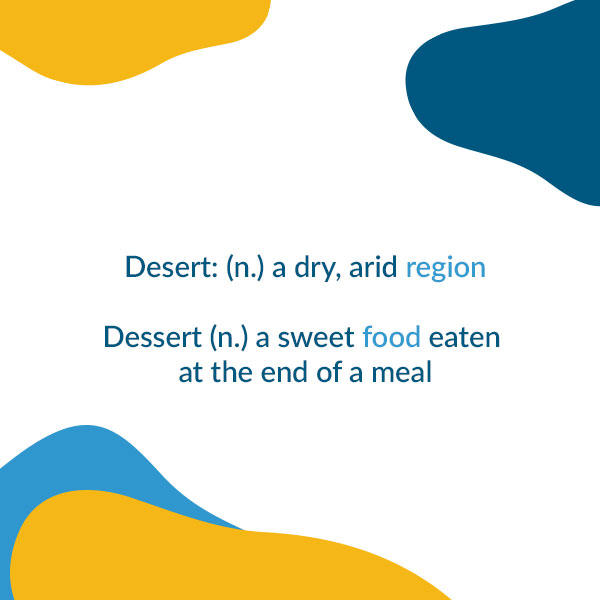
Discreet vs. Discrete:
Discreet is an adjective meaning judicious or showing prudence: "He made sure to be discreet when talking to the press." Discrete is an adjective meaning separate or distinct: "Her business had five discrete functions."
Discussed vs. Disgust:
Discussed is the past tense form of a verb that means to converse: "Have you discussed the wedding plans with Carl yet?" Disgust is a noun that means a feeling of revulsion or disapproval: "Kate looked at Angie with disgust after she burped at the table."
Disinterested vs. Uninterested:
Disinterested is an adjective that means impartial and unbiased, having no stake in the outcome: "We need advice from a neutral, disinterested party." Uninterested is an adjective that means not interested at all: "My girlfriend is uninterested in the chick flicks I try to make her watch."
Dose vs. Doze:
Dose is a verb that means to be given an amount of a substance, such as medicine: "After his surgery, he was dosed with morphine to help with the pain." It can also be used as a noun to refer to the amount of the medicine: "Please may I have a dose of cough medicine?" Doze is a verb that means to sleep lightly: "I'm going to doze in this deck chair all afternoon."
Draft vs. Draught:
Draft is a noun that means an early stage of a product or the first version of your writing: "The rough draft is due Tuesday." In US English, draft also refers to a gust of air in an enclosed space: "Close the window, or y'all will let in a draft!" In UK English, this is spelled draught: "Do close the window, Lady Pennywhistle, or you shall let in a draught."
Draw vs. Drawer:
Draw is a verb that means to use a writing device to create an image rather than writing words: "I want to draw a picture of that apple." Drawer is a noun that refers to something that can be opened and used to store items: "Open the drawer on that dresser and see what I put in there for you."
Drier vs. Dryer:
Drier is an adjective that means less damp: "The glue has to be drier before you can touch it." Dryer is a noun that refers to a machine that dries wet materials, such as clothes or hair: "If you put wool in the dryer, it will shrink."
Dual vs. Duel:
Dual is an adjective that means made up of two parts: "Bleach and chlorine make up the dual power in this laundry cleaning product." Duel is a noun that means a battle with someone, either in a fight or a contest: "Sir Rothschild, my good man, I challenge you to a duel!"
Dyeing vs. Dying:
Dyeing is a noun that refers to the process of changing the color of something, such as wool or hair, by adding colored dyes: "Dyeing your hair blue is considered slightly rebellious." Dying is an adjective that refers to the process of passing on from physical existence: "Her dying wish was for her children to set aside their feud and reunite with one another."
e.g. vs. i.e.:
The short form of for example is e.g.: "I like many different birds (e.g., owls, eagles, and crows)." The short form of that is is i.e.: "My favorite birds are nocturnal (i.e., birds that are active at night)."
Elicit vs. Illicit:
Elicit is a verb meaning to draw out: "The officer tried to elicit the truth from the suspect." Illicit is an adjective meaning illegal: "He seemed to have no information about the illicit drug ring."
Emigrate vs. Immigrate:
Emigrate is a verb that means to leave one country to live in another: "The family emigrated from the UK." Immigrate is a verb that means to move to another country: "The family immigrated to Canada 20 years ago."
Eminent vs. Imminent:
Eminent is an adjective that refers to something or someone worthy of recognition due to a noteworthy quality or influence: "Eminent members of the government include the Prime Minister, Cabinet members, and MPs." Imminent is an adjective that refers to something that hasn't happened yet but is about to take place: "In November, the arrival of winter is imminent."
Empathize vs. Emphasize:
Empathize is a verb that means to have sympathy: "She could really empathize with how he was feeling." Emphasize is a verb that means to give emphasis, or stress, to something: "He emphasized how upset he was by bursting into tears."
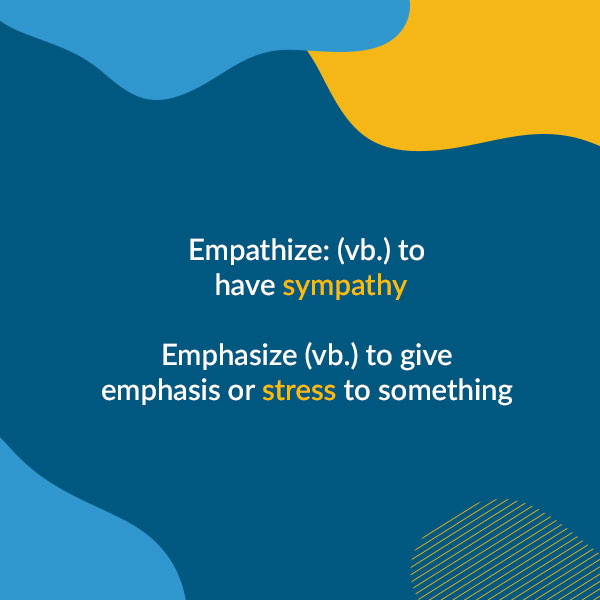
Envelop vs. Envelope:
Envelop is a verb meaning to wrap up or to cover entirely: "She was grateful that her cloak was big enough to envelop her." Envelope is a noun that means a flat paper container: "She mailed her letter in a small white envelope."
Exalted vs. Exulted:
Exalted is an adjective that means held in high regard: "The Prime Minister holds an exalted office in Canadian society." Exulted is the past tense of a verb that means to celebrate and show enjoyment: "He exulted after hearing about his raise."
Exercise vs. Exorcise:
Exercise is a verb that refers to activities performed to get or stay in shape: "I am going to exercise as soon as my yoga class starts." It can also be used as a noun referring to the activities themselves: "Exercise is an important part of a healthy lifestyle." Exorcise is a verb that means to exile a demon through religious ritual: "The man decided to exorcise the spirits from his house."
Explicit vs. Implicit:
Explicit is an adjective meaning fully or clearly expressed: "She was explicit about the rules, stating in no uncertain terms that the children must not leave the house." Implicit means implied or not expressly stated: "Their trust in her was implicit."
Faint vs. Feint:
Faint is an adjective that means barely perceptible or very weak: "The sound was so faint, I could barely hear it." It can also be a verb that refers to a sudden loss of consciousness: "The noise was so loud, I thought I might faint." Feint is a noun that means a diversion—something that takes attention away from another event: "During the fight, he feinted left before bombing an overhand to his opponent's jaw."
Fair vs. Fare:
Fair is an adjective that refers to making an unbiased decision: "To be fair, you should split the pizza down the middle so we get the same amount." Fare is a noun that means the cost required for transportation: "The boat has a cheaper fare than the plane, but it will take much longer."
Farther vs. Further:
Farther and further are both adjectives and adverbs meaning at a distance. Farther should be used when referring to physical distances: "The house is just a little farther down the road." Further should be used for figurative distances: "I can't wait to discuss this further."
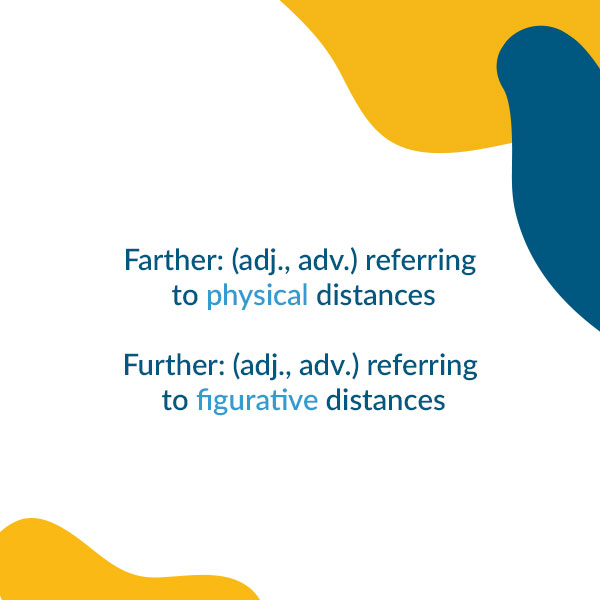
Faun vs. Fawn:
Faun is a noun that refers to a mythical creature, originating in Greek mythology, that is half man and half goat: "Mr. Tumnus is the kind faun in The Lion, the Witch, and the Wardrobe." Fawn is a noun that means a baby deer: "The fawn happily pranced toward the forest with its mother."
Faze vs. Phase:
Faze is a verb meaning to be disturbed: "It will take a lot more than that to faze me!" Phase is a noun meaning one part of a process: "In this phase of his life, he was content to stay home on Saturdays and get to bed at a reasonable hour." It can also be used as a verb meaning to perform in stages: "We are phasing out our children's menu."
File vs. Phial:
File is a noun that means a space where particular information is organized and stored: "I need to make a new file on my hard drive for the pictures we took on our vacation." Phial is a noun that means a small bottle that can contain fluid: "In science class, we used glass phials to hold small amounts of chemicals."
Flair vs. Flare:
Flair is a noun that means a particular talent for something: "Ted has a flair for playing the tuba." It can also refer to an attention-grabbing quality: "Those red shoes add flair to that plain black dress." Flare is a verb referring to when a fire grows in strength: "The fire will flare when you add that cardboard." It can also indicate the sudden eruption of a potentially violent situation: "The argument is likely to flare up if you don't apologize quickly."
Flaunt vs. Flout:
Flaunt is a verb that means to show off: "You shouldn't flaunt your wealth." Flout is a verb that means to show disdain for something: "By wearing a red pantsuit to the funeral, he was flouting the rules of decorum."
Flounder vs. Founder:
Flounder is a verb that means to move awkwardly while trying to accomplish something: "He floundered with the apology, unsure of what he ought to say." Founder is a verb that means to fail, collapse, or cave in: "That relationship is sure to founder." It can also be used as a noun to refer to someone who establishes a company, settlement, or institution: "Larry Page and Sergey Brin are the founders of Google."
Flour vs. Flower:
Flour is a noun that refers to a popular baking supply used in recipes for foods such as breads and cakes: "We need two cups of flour for this cookie recipe." Flower is a noun that refers to a plant people enjoy in their gardens or public places: "Let's put flowers along the driveway."
Forbear vs. Forebear:
Forbear is a verb that means to abstain or resist from doing something: "You must forbear having that sixth drink." Forebear is a noun that means an ancestor or someone living before your time: "Native Americans pay respect to their forebears through traditional song and dance."
Forbidding vs. Foreboding:
Forbidding is an adjective that refers to a dangerous task or person: "The mountain looked dark and forbidding, with many likely hazards." Foreboding is an adjective that means gloomy or threatening: "The raven on the decaying barn roof was a foreboding sign."
Foregoing vs. Forgoing:
Foregoing is an adjective that means going before or preceding: "She had to read the foregoing paragraphs in order to understand the conclusion." Forgoing is the past participle of verb that means to give up or do without: "I am forgoing my dessert, as I am already much too full from dinner."
Foreword vs. Forward:
Foreword is a noun that means the section at the beginning of a book that introduces the content: "I want to write a foreword to my memoir, but it can't be too revealing." Forward is a directional adverb that means coming up or up ahead (as opposed to backward): "Move your chair forward so you're closer to the stage."
Formally vs. Formerly:
Formally is an adverb that means officially or properly: "All the wedding guests were formally dressed." Formerly is an adverb that refers to something that was different in the past: "My math teacher was formerly a professional belly dancer."
Foul vs. Fowl:
Foul is an adjective meaning highly unpleasant: "The garbage dump has a foul stench." Fowl is a noun that refers to a type of bird: "The farmer kept turkeys, chickens, and other fowl in the big red barn."
Freeze vs. Frieze:
Freeze is a verb that means to cause molecules to enter an extremely slow-moving state as a result of being placed in a cold environment: "To make a popsicle, you need to freeze fruit juice." Frieze is a noun that refers to the horizontal strip, often sculpted or decorated, that lines the top of a wall: "The Parthenon features an elaborate frieze that was sculpted between c. 443 and 438 BC."
Gaff vs. Gaffe:
Gaff is a noun that refers to a large hook made of a strong metal, such as iron, used by climbers and fishermen: "Hook the gaff in the rock, and we will work our way up the mountain." Gaffe is a noun that means an awkward error or mistake: "Accidentally burping in public is an embarrassing gaffe."
Garner vs. Garnish:
Garner is a verb that means to collect or gather: "The treasure hunt required us to garner a number of unusual objects." Garnish is a verb that means to embellish by adding decoration: "You can garnish your salmon with some dill spice."
Gauge vs. Gouge:
Gauge is a noun that refers to something that is used to measure: "An air pressure gauge will tell you if you should fill your tires." It can also be a verb meaning to estimate a measurement: "I can't gauge distance without my glasses on." Gouge is a noun that means a tool with a rounded blade used to scoop or dig: "Use the gouge to clean out the pumpkin." Gouge is also a verb meaning to scoop, dig, or make a groove: "The river had gouged a winding channel through the rock."
Gibe vs. Jibe vs. Jive:
Gibe can be used as a verb that means to laugh at, tease, or mock: "The older girls always gibe the younger ones." It can also be used as a noun to mean an insulting remark: "He made a cruel gibe about my appearance." Jibe is a verb that means to change course on a sailboat by shifting the sail abruptly and powerfully from one side to the other: "If we jibe the sail, we can go back home." Jive is a noun that refers to being in synchronization, unity, or agreement: "Our working styles didn't quite jive, so we decided to work separately." Jive is also a style of lively jazz music: "The jive is a style of dance pioneered by African Americans in the 1930s."
Good vs. Well:
Good is an adjective meaning excellent or satisfactory: "You are very good at playing the trumpet!" Well is an adverb meaning thorough or satisfactory, and it can also be an adjective that means healthy: "She decided to stay home from work because she didn't feel well."
Grisly vs. Grizzly:
Grisly is an adjective that means horrible or disgusting: "This was certainly the scene of a grisly murder." Grizzly is a noun that refers to a bear: "The California grizzly is a majestic bear." Grizzly can also be an adjective that means streaked with gray: "The lumberjack wore a flannel shirt and had a long, grizzly beard."
Hawk vs. Hock:
Hawk is a noun that refers to a variety of birds of prey: "The red-tailed hawk can dive at a speed of 120 miles per hour." Hock is a noun that refers to an ankle-like joint found in animals such as horses and pigs: "Soup made from a pig hock is delicious."
Heal vs. Heel:
Heal is a verb that refers to a process in which an injury gets better: "Let the scab heal, and it will just be a small scar." Heel is a noun that refers to the back part of a foot: "A shoehorn helps you slide your heel into a shoe."
Hear vs. Here:
Hear is a verb that refers to the sense that allows us to listen to our surroundings: "I know you're yelling, but I still can't hear you." Here is an adverb that implies that you have arrived at a destination: "It may have taken five hours, but we're finally here."
Hoard vs. Horde:
Hoard is a noun that means a supply or a verb that means to accumulate: "After collecting acorns all summer, the squirrel had gathered quite a hoard." Horde is a noun that means a large group: "A horde of people gathered around the celebrity, asking for photos and autographs."
Hole vs. Whole:
Hole is a noun that means an opening or empty area in a solid object: "The golf ball was 10 feet from the hole." Whole is an adjective that refers to the entirety of something: "The whole room was singing along."
Home vs. Hone:
Home is a noun that means a place where you, your family, and your belongings reside: "I'm going home for dinner tonight." However, home is also used as a verb in the expression "to home in," meaning to identify and focus on something: "Let's home in on the most important issue." Hone is a verb that means to master or perfect an ability: "To become an author, you need to hone your writing skills."
Idle vs. Idol:
Idle is an adjective that means inactive or not moving: "We made idle conversation about the weather before going our separate ways." Idol is a noun that means an image of a god used as an object of worship or someone who is looked up to by another: "The people bowed before the idol."
Imply vs. Infer:
Imply is a verb that means to indicate or suggest without being specific: "I didn't mean to imply that I don't care about you." Infer is a verb that means to guess or speculate: "From his hunched posture and pronounced frown, she inferred that he was feeling very disappointed."
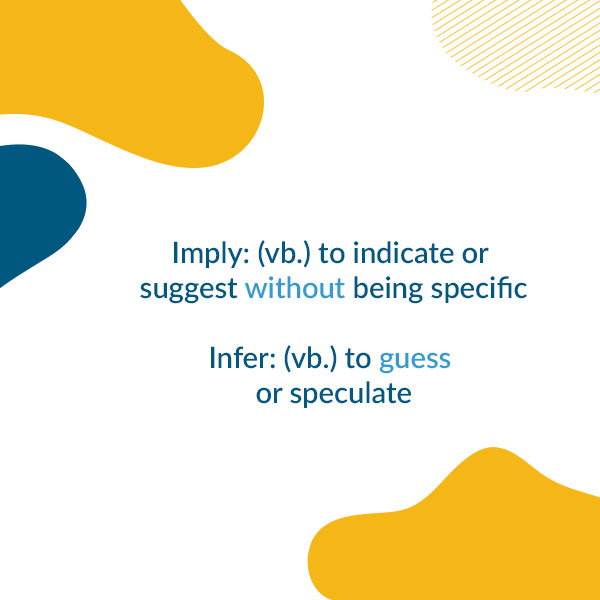
Incite vs. Insight:
Incite is a verb that means to provoke action: "I am going to incite a boycott of this company to protest unethical practices." Insight is a noun that refers to an idea or realization you have about something: "We need your dad's insight before we buy this car."
Install vs. Instill:
Install is a verb that means to establish, mount, or make ready for use: "You have to install the video game on the computer before you can play it." Instill is a verb that means to cultivate something within someone: "You can instill good manners in any child if you lead by example."
It's vs. Its:
It's is a contraction of it is: "I love this show. It's so funny to watch!" Its is a pronoun and is the possessive form of it: "Come quickly! The kitten is chasing its own tail."
Lay is a verb meaning to place or put, and it requires a direct object: "Lay down your pens, please, students." Lie is a verb meaning to recline or rest, and it never has a direct object: "Now that the test is over, I can finally lie down and rest." Here's the tricky part: lay is also the past tense of the verb lie: "After work, he decided to lay down for a nap." Last, lie can also mean to tell something that is untrue: "Don't lie to me about who broke this vase."
Lead vs. Led:
Lead (rhyming with reed) is the present tense of the verb to lead, meaning to guide a person or group: "I will lead you to the fountain of youth." Led is the past tense of the verb to lead: "I led them to the park, but I didn't stay." Lead (rhyming with red) is a type of metal often used in roofing and plumbing: "When lead was found to be dangerous, the use of lead paint was largely discontinued."
Leak vs. Leek:
Leak is a noun that refers to a small hole where liquid, powder, or gas can escape: "There is a leak in the bottom of the bucket." A leek is a vegetable with a stalk and leaves, similar to an onion: "This recipe calls for two leeks."
Least vs. Lest:
Least is an adjective that means the smallest amount: "We need the least amount of friction possible." Lest is a conjunction that refers to averting or circumventing something: "Memorial Day is a holiday to reflect on past wars lest we forget the soldiers who fought for our freedoms."
Lessen vs. Lesson:
Lessen is a verb that means to reduce the amount or size of something: "You need to lessen the amount of water in that cup, or you'll spill it." Lesson is a noun that means something that is taught to you: "You need a lesson in manners."
Likeliness vs. Likeness:
Likeliness is a noun that refers to the probability of something happening: "The likeliness that you will actually win is slim." Likeness is a noun that refers to a similarity or resemblance: "The painting of the man was a good likeness."
Loath vs. Loathe:
Loath is an adjective that means reluctant or unwilling: "She was loath to try the sandwich." Loathe is a verb that means to feel disgust: "She didn't want the sandwich because she loathed salami."
Loose vs. Lose:
Loose is an adjective used to describe something that doesn't fit tightly: "I bought this skirt when I was overweight, and now it is too loose." Lose is a verb that means to misplace something: "I always lose my keys when I put them in this giant purse."
Mantel vs. Mantle:
Mantel is a noun that means a ledge found above a fireplace: "I hung the family portrait above the mantel in the living room." Mantle is a noun meaning cloak or shawl: "I pulled my mantle over my face when the sandstorm started."
Marital vs. Martial:
Marital is an adjective that means pertaining to marriage: "The newlyweds were looking forward to years of marital bliss." Martial is an adjective that means warlike: "Karate, Taekwondo, and Kung Fu are martial arts that originated in Japan, Korea, and China, respectively."
May is a verb used to express possibility, permission, or hope: "You may miss class today because you are sick." Might is the past tense of may: "When you were sick, you might skip class, but now that you are well, you must come." Might is also used in questions and requests: "Might I ask you a question?"
Medal vs. Metal vs. Mettle:
Medal is a noun that refers to an award typically given to worthy candidates for an impressive accomplishment: "If you win the race, you get a gold medal." Metal is a noun that refers to a typically hard, opaque material that has good electrical and thermal conductivity: "Take off your metal watch before you walk through the detector." Mettle is a noun referring to someone's fortitude or ability to deal with a high-pressure situation: "The final obstacle course will be a test of the contestants' mettle."
Meter vs. Metre:
Meter is a noun that refers to something that measures something else: "The parking meter records the amount of time you have been parked in a particular spot." Meter is also a unit measuring length or distance; 100 centimeters = 1 meter. Metre is the preferred spelling in UK English when referring to the unit of measure: "There is a pub located just a few metres from our hotel."
Militate vs. Mitigate:
Militate is a verb that means to oppose something with force or influence: "You should militate against animal cruelty." Mitigate is a verb that means to make something less serious or harsh: "I like to mitigate tense situations by making jokes."
Miner vs. Minor:
Miner is a noun that means someone who works in a mine: "The miner hadn't seen daylight in 27 years." Minor is a term used to describe someone who has not reached society's stipulated age of adulthood: "Those minors shouldn't be drinking alcohol!"
Minuet vs. Minute:
A minuet (rhymes with net) is a type of dance or music set to ¾ time and was common in Europe in the 17th century: "Everyone in the ballroom danced a beautiful minuet." Minute (rhymes with kit) is a measurement of time amounting to 60 seconds: "Wait one minute before you eat the hot soup." Minute (rhymes with root) is also an adjective that means extremely small or slight: "He noticed only minute differences between the two pictures."
Moot vs. Mute:
Moot is an adjective that refers to a debatable topic with no practical significance: "The debate this Thursday is moot, as it couldn't possibly produce any change." Mute is an adjective that means making no sound: "Make the TV mute so I don't have to listen to your show while I read."
Moral vs. Morale:
Moral is a noun that refers to a standard of behavior in terms of right and wrong: "The lying, conniving embezzler had no morals at all." It can also be used as an adjective to describe someone whose values and behaviors are upstanding: "Our mayor is a moral leader who would never allow corruption in her government." Morale is a noun that refers to the excitement and spirit of a group: "The cheer squad really knows how to raise the morale of the audience."
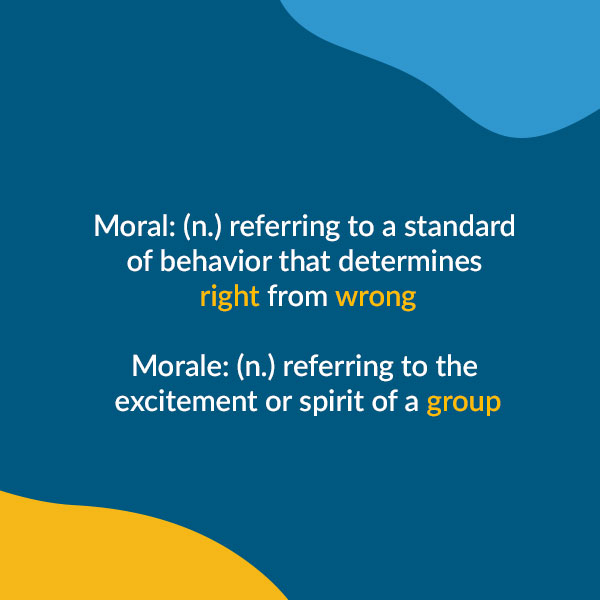
Morning vs. Mourning:
Morning is a noun that refers to the time of day from sunrise to noon: "I find it really hard to wake up in the morning." Mourning is a verb that refers to grieving over a loss: "The wife is mourning the death of her husband."
Naval vs. Navel:
Naval is an adjective that refers to ships and the navy: "The naval officer climbed aboard the ship and commanded that the anchor be raised." Navel is a noun meaning the location where the umbilical cord is located on newborns, also known as the belly button: "He noticed he had lint in his navel."
Official vs. Officious:
Official is a noun meaning a person elected or appointed to office: "The official instructed us to get out of the car." It is also an adjective meaning authorized or authoritative: "They received an official warning." Officious is an adjective meaning unnecessarily aggressive in the unwanted offering of one's services: "The officious bureaucrat spent all morning telling them what to do."
Oppress vs. Repress:
Oppress is a verb that means to dominate something or someone: "The invaders wanted to oppress the people native to the land." Repress is a verb that means to contain or hold in: "Don't repress the bad memory: you need to talk about it."
Pair vs. Pear:
Pair is a noun that means two pieces that belong together: "A single shoe is useless; you need a pair." Pear is a noun that refers to a type of fruit: "For lunch, I'm eating a pear-and-cranberry salad."
Palate vs. Palette:
Palate is a noun referring to one's sense of taste: "He had a very sophisticated palate—he especially loved fine wine." Palette is a noun meaning a set of colors on a board used by an artist: "The artist picked up her palette, dipped her brush in the blue paint, and began to work."
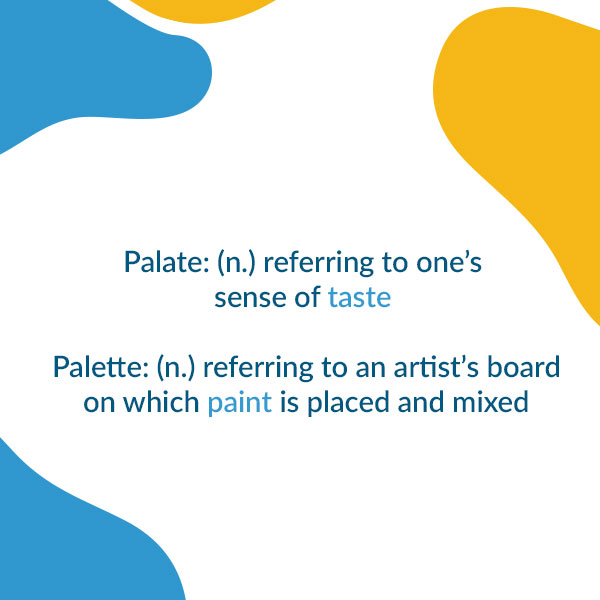
Peak vs. Peek:
Peak is a noun that refers to the top or highest point of something: "The mountain peak is 1500 feet from the ground." Peek is a verb that means to look quickly in order to catch a glimpse of something you are likely not supposed to see: "I peeked in the office to see my work schedule a day early."
Pedal vs. Peddle:
Pedal is a noun meaning a lever that is worked by the foot. It is also a verb meaning to use pedals: "She pedaled her bike faster to get away from him, but her foot slipped off the pedal." Peddle is a verb meaning to sell something door to door: "To earn money, the man decided to peddle his wares on the street."
Petty vs. Pretty:
Petty is an adjective that means trivial or stooping to low standards: "Spreading that rumor was very petty of you." Pretty is an adjective used to describe something that is attractive to you: "That ring is very pretty."
Pole vs. Poll:
Pole is a noun that refers to a long, cylinder-shaped object: "The pole sticking out of the ground was made of metal." A poll is a survey: "I'm taking a poll: do you prefer white or whole wheat bread?"
Pore vs. Pour:
Pore is a noun that means a small hole or opening: "You have pores in your skin that are too small to see." Pour is a verb that describes a way to make a non-solid material flow from one container to another: "Please pour me some more tea."
Practice vs. Practise:
Practice is a noun that refers to the use of something, such as an idea, theory, or process: "Brushing twice a day is a healthy practice." It can also be used as a verb meaning to repeat in the hopes of improvement over time; "I practice the piano every day." Practise is the UK spelling of the same verb: "In Britain, practise makes perfect."
Pray vs. Prey:
Pray is a verb meaning to petition, thank, or converse with a deity: "The little girl knelt by her bed to pray." Prey is a noun meaning a person or animal that is hunted. "Mice are a common prey of owls." Prey is also a verb meaning to seize or devour or to exert a harmful influence: "Owls sometimes prey upon squirrels and rabbits."
Prescribe vs. Proscribe:
Prescribe is a verb meaning to advise the use of a certain medicine: "The doctor prescribed antibiotics to clear up the infection." Proscribe is a verb that means to denounce, forbid, or condemn: "The new law was going to proscribe public gatherings."
Principal vs. Principle:
Principal is a noun meaning chief or head. It can also be an adjective meaning highest in rank: "The principal of the middle school was strict but kind." It can also be an adjective meaning highest in rank: "The president plays the principal role in governing the country." Principle is a noun meaning a rule, law, or characteristic: "Students must follow the basic principles of good behavior."
Raise vs. Raze vs. Rise:
Raise is a noun that means a promotion to a higher level, typically in a work environment: "John decided he was going to ask for a raise." It is also a verb meaning to lift up: "The sunshine helped to raise my spirits." Raze is a verb meaning to completely destroy: "The Vikings razed the village." Rise is a verb that means to move up from a lower position: "The sun will rise from the lowest to the highest point in the sky by noon."
Regretful vs. Regrettable:
Regretful is an adjective meaning to be full of regret: "The boy sat in the corner feeling deeply regretful that he had hit his friend." Regrettable is an adjective meaning deplorable or unfortunate: "Although closing the store is the right decision, the fact that so many employees will lose their jobs is regrettable."
Ring vs. Wring:
Ring is a noun that refers to a piece of jewelry that goes around your finger: "A ring on the fourth finger of your left hand is symbolic of marriage." Wring is a verb that means to twist something: "Wring out the towel before you bring it in the house."
Role vs. Roll:
Role is a noun that refers to a part one plays or a position one holds: "Charlie Sheen seems to play the same role in every show he's in." Roll is a verb that means to move in a spinning motion: "The loose tire rolled down the hill and into the river."
Rye vs. Wry:
Rye is a noun that refers to a type of grass that is made into grain and used in flour: "Rye bread is better for you than white bread." Wry is an adjective that refers to something that is wound or twisted: "She twisted her mouth into a wry smile at the irony."
Seam vs. Seem:
Seam is a noun that refers to the place where two pieces of material are sewn together: "I lost my money when the seam of my pocket came undone." Seem is a verb that describes how something (e.g., a situation or a conversation) appears: "It seems like he doesn't care what we do tonight."
Sense vs. Since:
Sense is a noun that refers to the five ways we perceive stimuli from our surroundings (hearing, touch, sight, smell, and taste): "His terrible cold meant he had no sense of taste or smell." Since is a preposition referring to time past: "He has lived in that house since he was 12 years old."
Shear vs. Sheer:
Shear is a verb that means to cut or to remove: "The farmer sheared the wool from the sheep." Sheer is an adjective that means transparent: "The sheer material allowed the sunlight to shine through, giving the room a bright and happy feel."
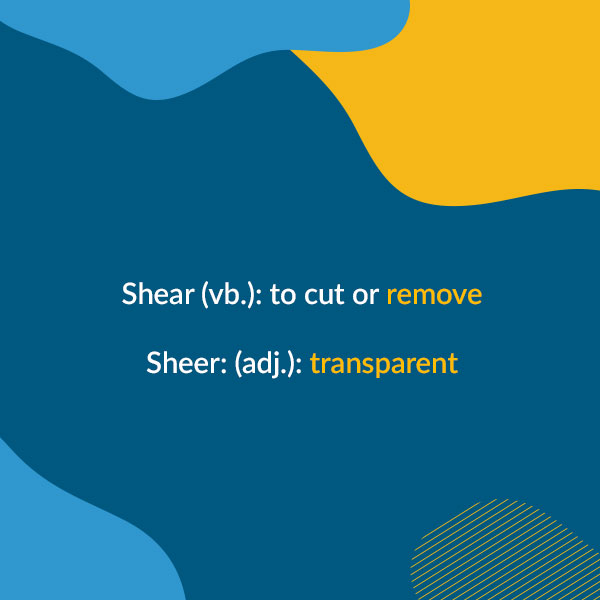
Stationary vs. Stationery:
Stationary is an adjective meaning still or not moving: "The car was stationary as it sat at a red light." Stationery is a noun meaning writing paper and other office supplies: "She wrote the love letter on scented stationery."
Storey vs. Story:
Storey is the UK spelling of the noun meaning a floor of a building or structure: "The 110-storey building dominated the city's skyline." Story is the US spelling of the same noun, and it also means a narrative: "The little girl wanted to hear a story before bed."
Suit vs. Suite:
Suit is a noun meaning an article of clothing: "The groom wore a suit to his wedding." It is also a verb meaning to be appropriate: "I don't think this hat suits me very well." Suite is a noun meaning a set of things forming a series or combination: "The hotel suite included a living room, sitting room, kitchenette, and bathroom."
Suppose vs. Supposed:
Suppose is a verb that means to assume or believe something based on an uncertain argument: "I suppose you'll criticize this show." Supposed is an adjective that refers to something that is assumed to be true despite a lack of evidence: "She swore she had seen Bigfoot, but none of her pictures of the supposed monster actually showed anything."
Taut vs. Taught vs. Tout:
Taut is an adjective used to describe something that is tight or stretched: "The taut wire was positioned at ankle height, ready to trip the intruder." Taught is the past tense of the verb teach, which means to educate or instruct someone how to do something: "The professor taught her students how to solve the equation." Tout is a verb that means to hype up, advertise, or promote: "This singer is touted as the best in the country."
Than vs. Then:
Than is a conjunction and is used in comparative statements: "I'd rather go out for dinner than cook something here." Then can be an adverb, adjective, or a noun, and it is related to time: "The toddler's lip began to quiver, and then he started to cry."
Their vs. There vs. They're:
Their is a pronoun and is the possessive of they: "The children rode their bikes to the park." There is an adverb and pronoun meaning that place: "What will they do when they get there?" They're is a contraction of they are: "They're going to play on the swings."
To vs. Too vs. Two:
To is a preposition referring to a motion in a certain direction ("I think I will walk to school today") and a word that is used to create the infinitive of a verb ("I want to go home.") Too is an adverb and means in addition: "I would like some cake, and I'd like ice cream, too." Two is a number: "Could I please have two scoops?"
Vain vs. Vein:
Vain is an adjective that refers to feeling high levels of self-importance: "Stop thinking of yourself; you're so vain sometimes." Vein is a noun that refers to the tubes used to carry blood around the body: "When you donate blood, they have to find a good vein to insert the needle."
Waive vs. Wave:
Waive is a verb that means to relinquish something: "We will waive the registration fee if you sign up today!" Wave is a noun that refers to a hand gesture typically used to signify hello or goodbye: "Wave goodbye to your friends, Tom; they're leaving."
Wary vs. Weary:
Wary is an adjective that means careful: "Be wary of the roads; they're slippery." Weary is an adjective that means tired and with little energy: "I'm feeling weary after going on that run without eating breakfast."
Weather vs. Whether:
Weather is an umbrella term for various measures of the environment: "The weather is going to be clear all day." Whether is a conjunction that is used to draw attention to alternatives: "Whether or not you win determines whether you get a gold medal."
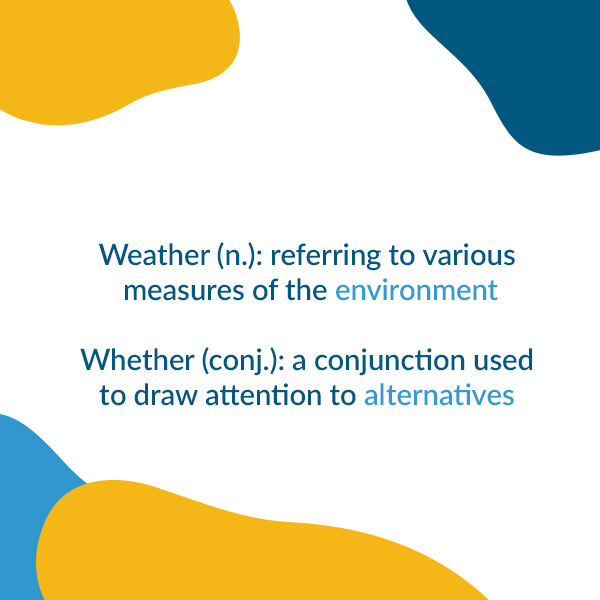
Who is a pronoun used to refer to the subject of a sentence, or the person completing an action: "Who is going to the party?" Whom is a pronoun used to refer to the object of a sentence, or the person receiving an action: "I don't know whom she invited."
Who's vs. Whose:
Who's is a contraction of who is: "Who's going to claim responsibility for this mess?" Whose is a pronoun and is the possessive of who or which: "Whose pencil is this?"
Wound vs. Wound:
Wound can be a noun that means an injury. It can also be a verb that means to injure: "She was wounded by the sword." Wound is also a verb that is a participle of the verb wind: "He followed the river as it wound through the forest."
Your vs. You're:
Your is a pronoun and is the possessive form of you: "Your bicycle is so cool!" You're is a contraction of you are: "You're not being very nice."
Image source: Hans/Pixabay.com
Confused? Let an Expert Check Your Writing.
Hire an Expert Academic Editor, or Get a Free Sample
About the Author
Scribendi's in-house editors work with writers from all over the globe to perfect their writing. They know that no piece of writing is complete without a professional edit, and they love to see a good piece of writing turn into a great one after the editing process. Scribendi's in-house editors are unrivaled in both experience and education, having collectively edited millions of words and obtained nearly 20 degrees collectively. They love consuming caffeinated beverages, reading books of various genres, and relaxing in quiet, dimly lit spaces.
